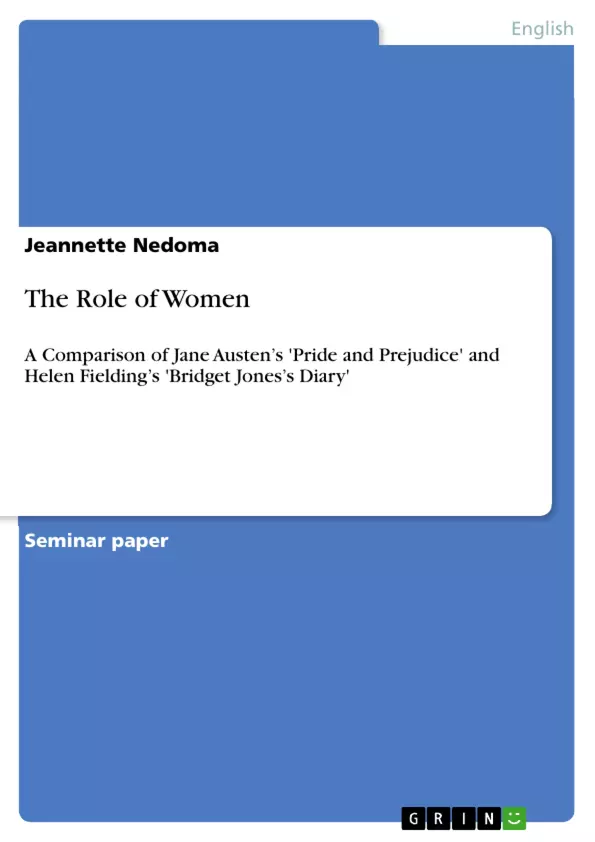Pride and Prejudice as well as Helen Fielding’s successful novel Bridget Jones’s Diary deal with the role of women in their contemporary societies and the skills the “accomplished woman” should have. One might think that the concept of the “accomplished woman” is only relevant in the 19th century but Fielding’s funny revised edition of the Pride and Prejudice subject has shown that this idea is still present nowadays. Since Austen’s novel was published in 1813 almost two centuries have passed, the role of women in society has changed through the years because of the feminist movements beginning in the 1960s. Nowadays women are able to depend completely on their own. They are not longer inferior to men, they gained the right to vote in the early 20th century and are able to have successful careers. Nevertheless the concept of the “accomplished woman” seems to be still significant at the present time. Fielding manages to move the concept of the “accomplished woman” into the future and it seems to be more popular than ever. Bridget Jones embodies a woman of the 1990s that struggles with her role in society in a similar way Elizabeth Bennet did almost 200 years ago.
Inhaltsverzeichnis (Table of Contents)
- Introduction
- Feminist Theory
- Comparison of Jane Austen's Pride and Prejudice and Helen Fielding's Bridget Jones's Diary
- Education, Skills and Career
- Finding a Husband & Marriage
- Appearance
- Conclusion
- Literature
- Internet Sources
Zielsetzung und Themenschwerpunkte (Objectives and Key Themes)
This term paper aims to compare Jane Austen's novel "Pride and Prejudice" with Helen Fielding's "Bridget Jones's Diary" and analyze the portrayal of women and their roles in society. The paper will explore the historical context, examining how societal expectations have evolved and how the concept of the "accomplished woman" continues to be relevant.
- The evolution of women's roles in society, from the 19th century to the 20th century.
- The enduring relevance of the "accomplished woman" concept in both historical and modern contexts.
- The influence of feminist theory on understanding gender roles and expectations.
- The impact of societal pressures and expectations on women, both in the past and present.
- A comparative analysis of female characters in "Pride and Prejudice" and "Bridget Jones's Diary."
Zusammenfassung der Kapitel (Chapter Summaries)
The introduction examines the concept of the "accomplished woman" as presented in Jane Austen's "Pride and Prejudice" and its contemporary relevance as seen in Helen Fielding's "Bridget Jones's Diary." The chapter explores the changing role of women in society, from the 19th century to the present.
The second chapter delves into feminist theory, highlighting its origins and impact on the understanding of gender roles and women's rights. The chapter discusses key feminist writers like Mary Wollstonecraft, Sarah Grimke, and Virginia Woolf and their contributions to the movement.
The third chapter compares the portrayal of women in "Pride and Prejudice" and "Bridget Jones's Diary," focusing on the key areas of education, skills, career, marriage, and appearance. The chapter analyzes the pressures and expectations faced by women in both novels.
Schlüsselwörter (Keywords)
The key themes and topics explored in this term paper include: "accomplished woman," feminist theory, gender roles, societal expectations, education, career, marriage, appearance, Jane Austen, Helen Fielding, "Pride and Prejudice," "Bridget Jones's Diary."
Frequently Asked Questions
What is the concept of the "accomplished woman"?
It refers to the societal expectations of women's skills and virtues, originally highlighted in the 19th century (Austen) and modernly reinterpreted (Fielding) regarding education, appearance, and social conduct.
How are Pride and Prejudice and Bridget Jones's Diary connected?
Bridget Jones's Diary is a modern revision of Austen's subject. Bridget embodies a 1990s woman struggling with societal roles and the pressure to find a husband, much like Elizabeth Bennet did 200 years prior.
How has the role of women changed since 1813?
Due to feminist movements since the 1960s, women gained the right to vote, can depend on themselves financially, and pursue successful careers, moving away from total dependence on marriage.
What role does appearance play in these novels?
Both novels show that women face significant pressure regarding their appearance as a means to secure social standing or a partner, though the specific beauty standards have evolved.
Which feminist writers influenced the understanding of gender roles?
The paper discusses key figures such as Mary Wollstonecraft, Sarah Grimke, and Virginia Woolf and their contributions to the movement for women's rights.
- Citation du texte
- Jeannette Nedoma (Auteur), 2009, The Role of Women, Munich, GRIN Verlag, https://www.grin.com/document/136362



